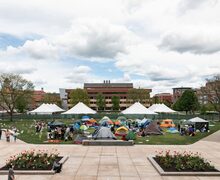Local, state politicians respond to Gaza Solidarity Encampment at SU
Joe Zhao | Asst. Photo Editor
Local officials who represent the Syracuse area — including Brandon Williams, Maurice “Mo” Brown and Charles Garland — shared their perspectives on Syracuse University's Gaza Solidarity Encampment to The Daily Orange.
Get the latest Syracuse news delivered right to your inbox.
Subscribe to our newsletter here.
UPDATE: This post was updated at 7:20p.m. on May 3, 2024.
Just over an hour after the Gaza Solidarity Encampment at Syracuse University began, congressman Brandon Williams demanded students and other organizers “get the hell out” and “never come back” in a Monday afternoon post on X, formerly known as Twitter.
Since Williams’ post, the encampment at SU has reached its fifth day with approximately 70 tents currently set up on SU’s Shaw Quadrangle. The encampment is composed of SU and SUNY ESF students, faculty and community members who are calling for SU to divest from Israel and support a ceasefire in Gaza, among other demands.
In response, local leaders and politicians who represent the Syracuse area shared their perspectives on SU’s GSE with The Daily Orange. Some representatives, like Williams, denounced the encampment and expressed concerns over antisemitism while others voiced support for the demonstrators’ right to organize and their demands.
“The students have a right to peacefully protest. Even if I didn’t agree with them, I would still agree that they have a right to protest,” said Onondaga County Legislator Maurice “Mo” Brown, who represents parts of SU and downtown Syracuse. “The issue at play doesn’t necessarily change that and I think we should be supporting them for using that right.”
Since April, the number of pro-Palestine demonstrations — which are broadly calling for universities to divest from Israel — has become more widespread at college campuses across the country as the Israel-Hamas war approaches its seventh month. More than 34,000 Palestinians have been killed since Israel began a bombardment campaign in response to an attack launched by Hamas on Oct. 7, The New York Times reported.
The nationwide pro-Palestinian demonstrations are calling for universities to divest from companies with ties to Israel and the ongoing conflict in Gaza. Like SU, colleges and universities are struggling with navigating the tension – especially as violence at protests continues to emerge.
SU’s response to the encampment has “been better” compared to other campuses like Columbia University, Brown said, where administrators upped police presence on campus and responded “with violence.” Brown said he commends SU for not responding to the encampment by “escalating a police presence.”
Similarly to Brown, Onondaga County Legislator Charles Garland said he embraces students’ rights to organize as long as “outside agitators” aren’t coming in.
“They should have a right to gather and also protest, but it shouldn’t be at the cost of the school’s function as an institution of education,” said Garland, who represents SU and most of downtown Syracuse. “Primarily, the students are there mainly to learn and we’d hate to think that with the protests, the encampment, that’s going to do anything to deter or take away from that.”
Neither Onondaga County Legislator Ryan McMahon nor Syracuse Mayor Ben Walsh responded to The Daily Orange’s request for comment on the encampment.
While no violence has been reported since the encampment began, New York State Senate Republican candidate Caleb Slater called for “the continued disruption of the educational process” at SU to be “condemned totally” in a Wednesday press release.
Slater, who is running to represent Syracuse in the state Senate against incumbent Democrat Rachel May, accused “woke professors” of radicalization and teaching organizers “the very tactics they are deploying.” In the release, Slater labeled the encampment at SU as a “disruption of peace.”
Salina Town Supervisor Nick Paro, a Republican candidate for the state Senate’s 50th district, wrote in a release that he supports the right to peacefully protest.
Paro, who graduated from SU’s College of Law in 2022, condemned the “disgusting and bigoted calls to violence,” specifically from Aziza Zahran, a graduate student organizer of SU’s encampment who previously made antisemitic tweets. Zahran is no longer with the encampment, the GSE confirmed to The D.O. Wednesday.
On the third day of the encampment, approximately 100 pro-Israel demonstrators walked from Ernie Davis Hall to the quad Wednesday as a sign of solidarity for Israel.
Like Paro, Williams has criticized the encampment as part of a larger series of nationwide protests which “condones violence.” In an email statement to The D.O., Williams wrote that his office has received calls from Jewish students at SU and “elsewhere” reporting they feel unsafe.
“I take this seriously. If you allow antisemitism to fester on your campus, you’ve made an enemy of me,” Williams wrote to The D.O.
In response to Williams’ public comments on X, the Syracuse branch of the Party for Socialism and Liberation, the Palestine Solidarity Collective at SU and the Instagram account blackatcuse released a joint post criticizing his “great hostility” of the encampment.
In a written statement to The D.O., May wrote that she hopes the GSE and university administrators continue to respect the First Amendment rights of student protestors.
“The act of peaceful and constructive protesting is an essential part of our democratic tradition,” May wrote in the statement. “As the spring semester draws to a close, my greatest hope is that the students and administration will continue to work together to ensure these rights are respected.”
Published on May 3, 2024 at 6:40 pm
Contact Dominic: dcchiapp@syr.edu | @DominicChiappo2





